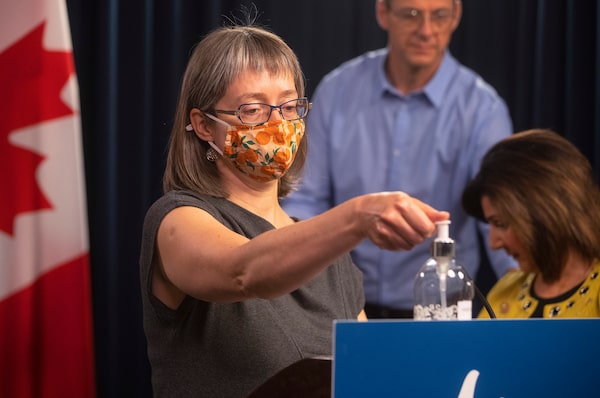
Dr. Deena Hinshaw, Alberta's chief medical officer of health, sanitizes her hands before providing an update on COVID-19 and back-to-school guidance in Edmonton, Friday, Aug. 13, 2021.JASON FRANSON/The Canadian Press
Good morning! Wendy Cox in Vancouver this morning.
By now, we should be used to all this: Just when COVID-19 case counts subside, we get walloped by some new variant that has been causing problems in other parts of the world and suddenly becomes a thing in Canada.
With depressing predictability, both British Columbia and Alberta were pushed to respond this week to the Delta variant and rising case counts. Their moves were remarkable, but for very different reasons.
British Columbia and Alberta got a taste of this rhythm of optimism, loosened restrictions, soaring case counts, then a return to restrictions earlier this year. In February, B.C.’s Provincial Health Officer, Bonnie Henry, urged British Columbians to stick to COVID-19 protocols through Family Day and Valentine’s Day in an effort to ensure a bit of freedom for March break. In Alberta, dropping hospitalizations allowed the province to lift some restrictions that had been imposed in December.
But two months later, both provinces experienced record numbers of cases, with daily counts numbering more than 1,000 in B.C. and more than 2,000 on some days in Alberta in early May. At the time, Alberta had the worst COVID-19 rate in the country, but B.C. wasn’t far behind.
Vaccinations have sent case counts tumbling and both British Columbia and Alberta lifted most restrictions July 1. Two weeks ago, Alberta took the unprecedented step of announcing that as of Monday, it would cease some of the most basic measures deployed during this pandemic: routine testing would end, contact tracing would end and anyone diagnosed with COVID-19 would not be required to isolate (though it remained strongly recommended.)
The Delta variant had been out there even when Alberta announced the end of restrictions, but over the past two weeks, it has entrenched itself in both provinces, its ease of transmissibility racing through unvaccinated populations. Both provinces once again lead the country in case counts by population.
On Friday, Deena Hinshaw, Alberta’s Chief Medical Officer of Health, said plans to transition into a new phase of living with the virus and dropping COVID-19 measures by Monday would be put on hold. The original plan had generated outrage and dismay from doctors and health officials in other provinces and on Friday, Dr. Hinshaw said isolation for COVID-19 patients would remain mandatory and testing would continue. As well, Alberta would extend a mask mandate for public transit.
“We are not going backwards. We are pausing to monitor and assess before taking a step forward,” Dr. Hinshaw said Friday.
Dr. Hinshaw said an unexpected rise in hospitalizations and emerging data from the United States on pediatric cases linked to the highly contagious Delta variant are behind the pause. She said the initial plan to remove all restrictions was partly based on evidence from Britain on the Delta variant, but emerging data from the United States shows different outcomes.
Globe columnist Kelly Cryderman writes today that Dr. Hinshaw has some work to do to gain back Albertans’ trust, starting with being more transparent with the data that informs her choices. But Kelly also points out that people should understand Dr. Hinshaw’s role is to provide advice: It’s Premier Jason Kenney and his cabinet that make the decision on how and whether to act on that advice.
As Lynora Saxinger, an infectious-diseases specialist at the University of Alberta, pointed out on Twitter this week: disagreeing with or debating actions and choices is fine, but assuming that public-health leaders have some evil or malignant motivation is not. “These are complex times and I don’t think anyone in public health is trying to endanger the public’s health,” she said.
B.C.’s Dr. Henry has been more restrained about the province’s reopening. She has not speculated on when testing, tracing and isolation might no longer be necessary. But in the face of rising case counts among the unvaccinated, Dr. Henry declared this week that all workers in long-term care facilities would have to be fully vaccinated by Oct. 12. No jab, no job.
“We have seen the impact of that in long-term care, where we now have eight outbreaks introduced by unvaccinated people,” she said. “Once it gets into these highly risky settings, it can spread even to those who are immunized. We have seen spread both to residents and staff.”
B.C. was the first province to initiate such a definitive mandate. In Ontario, the government will reportedly mandate vaccines for hospital workers and long-term care workers. Quebec Health Minister Christian Dubé said on Tuesday that he was examining the scenario and that a decision will be made in coming days.
Dr. Henry said Thursday that she would have more to say about vaccination policies in other sectors. Universities might be one of them: Several universities in Ontario, including the University of Toronto, this week declared students and staff would need to be vaccinated before they could attend in-person classes. B.C. universities have not followed suit. Yet.
This is the weekly Western Canada newsletter written by B.C. Editor Wendy Cox and Alberta Bureau Chief James Keller. If you’re reading this on the web, or it was forwarded to you from someone else, you can sign up for it and all Globe newsletters here.
 Wendy Cox
Wendy Cox James Keller
James Keller